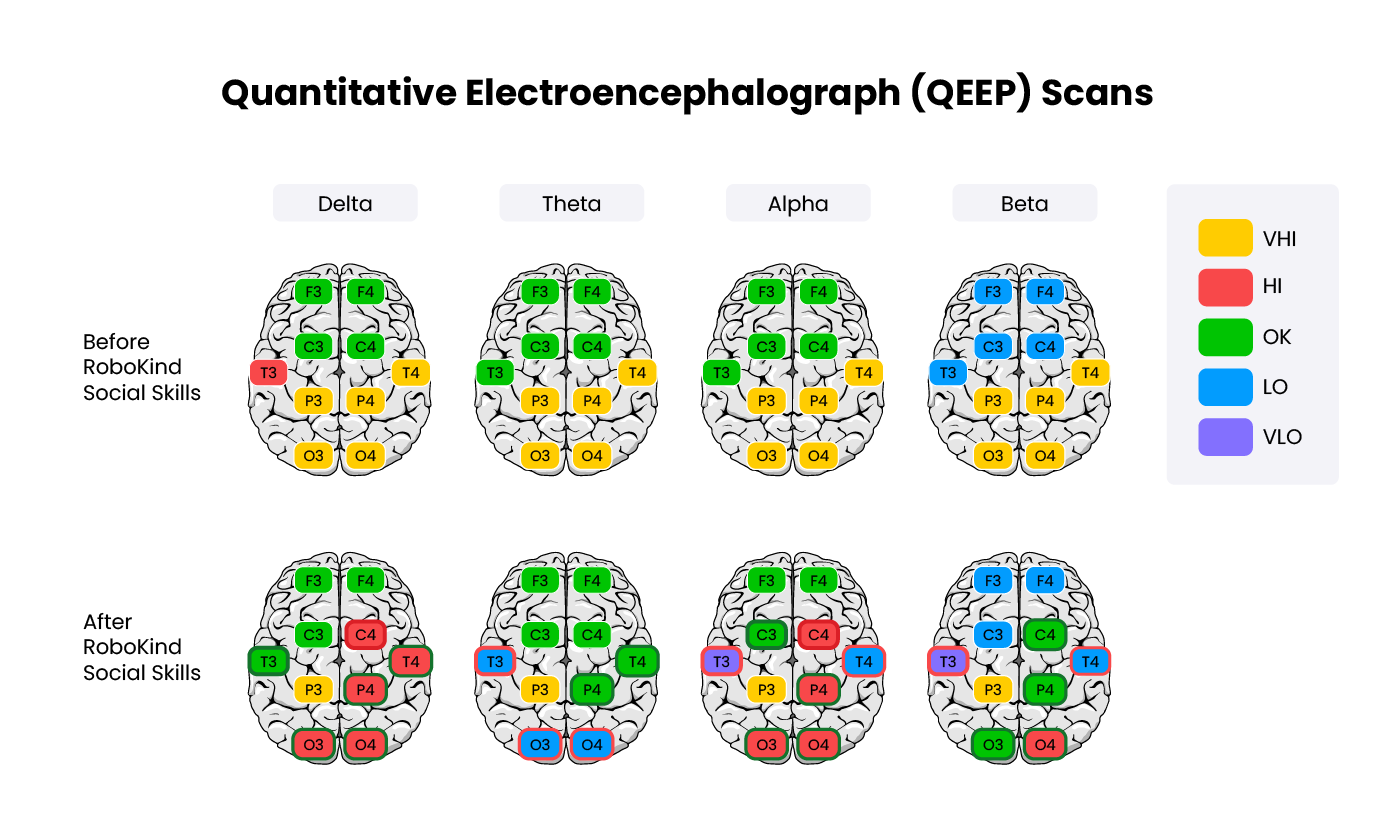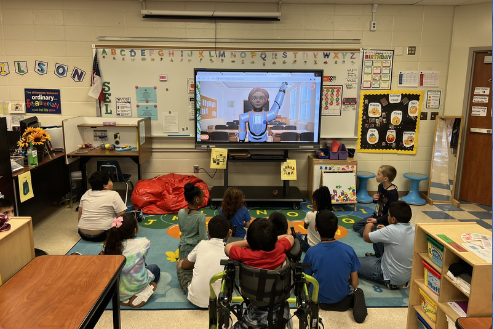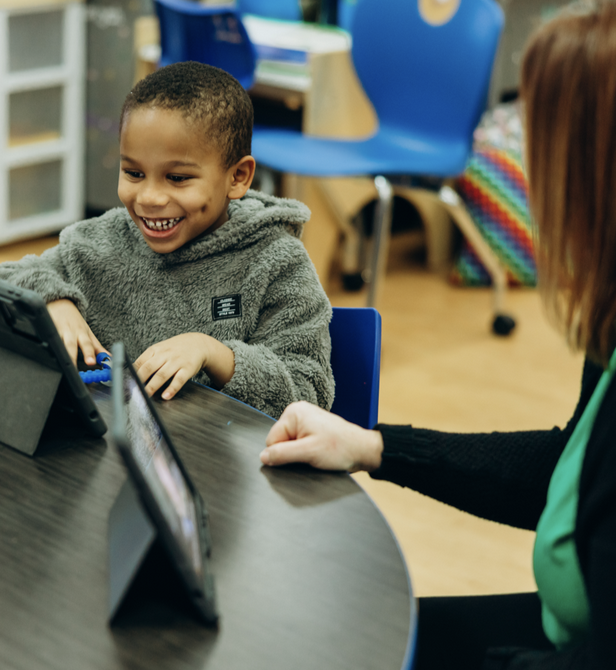Robokind: Special Tech for Exceptional Connections
At RoboKind, we believe in the power of special technology to drive exceptional outcomes. Our mission is to provide engaging, equitable, and effective curriculum tailored for teachers, special education classrooms, neurodiverse and young learners.
We’ve continued to come alongside teachers to create meaningful learning experiences for neurodiverse learners. This report highlights the outcomes that demonstrate the impact of our RoboKind Social Skills and RoboKind Phonics programs, backed by research, user data, and invaluable partner feedback.
Are your students engaged?
“Student engagement” is a term used to identify what learners do, think about, and feel when learning (Zepke, 2018). Student engagement plays a significant role in promoting student learning outcomes and teachers are searching for ways to improve their learners' doing, thinking, and feeling in the classroom. Engagement is a key component of academic success and the foundation of academic engagement rests on ideas related to student on-task behaviors and active participation in the learning environment (Harris, 2008). If neglected, lower engagement could lead to disengagement from the school environment and could contribute to the growing problem of students dropping out (Yazzie-Mintz & McCormick, 2012).
Engaged students are more successful academically and in the development of communication, behavior, and social skills necessary for success in today’s labor market, including the ability to operate and interact in autonomous, creative, and collaborative ways. School engagement plays an influential role in promoting academic competence and positive social relations between teachers and students (Eccles & Roeser, 2011; Li & Lerner, 2013).
Traditional approaches aren't built for SPED
Traditional learning methods, which rely heavily on lectures, memorization, and standardized tests, can be particularly challenging for students in Special Education classrooms. These methods often require students to process and retain information quickly and accurately, which can be difficult for many neurodiverse learners.
Traditional learning methods don’t always accommodate the unique needs of students with learning disabilities. Chrisholm Academy, a specialized school program in Ontario, explains that students with dyslexia may struggle to read quickly enough to keep up with lecture-based learning, while students with ADHD may have difficulty focusing for long periods of time.
Teacher Burnout is at an all-time high
At the onset of the 2023-24 school year, a staggering 70 percent of surveyed schools reported vacancies for Special Education teachers. This creates significant challenges for schools, most of which are already understaffed, to provide free and appropriate education (FAPE) and support for students with diverse learning needs.
Multisensory strategies that create fun foundations
RoboKind’s Virtual Avatars are revolutionizing the way students engage with curriculum and reach their goals! The engaging and interactive nature of the Virtual Avatars facilitates a gamified learning experience featuring Evidence-Based Practices such as Visual Supports, Video Modeling and Social Narratives. Students have the opportunity to learn-through-play with multi-sensory inputs and strategies that light up the brain!
Evidence-based curriculum to drive outcomes
Evidence-based practices (EBPs) are interventions, processes, and occupational practices that are based on evidence. Particularly, this evidence has scientific rigor and demonstrated effectiveness in target populations. For neurodiverse learners, evidence-based practices require serious review and consideration of multiple factors.
With the publication of the "National Standards Report" in 2009, the National Autism Center created a methodology for deploying EBPs in the classroom and for autistic students. This framework is much more nuanced and, importantly, considers four major factors and considerations with deploying EBPs, quoted directly below:
Serious consideration should be given to Established Treatments because there is sufficient evidence that (a) the treatment produced beneficial effects and (b) they are not associated with unfavorable outcomes (i.e., there is no evidence that they are ineffective or harmful) for individuals on the autism spectrum.
The values and preferences of parents, care providers, and the individual with ASD should be considered.
The judgment of the professionals with expertise in Autism Spectrum Disorders (ASD) must be taken into consideration. Once treatments are selected, these professionals have the responsibility to collect data to determine if a treatment is effective.
Treatment providers should be well positioned to correctly implement the intervention. Developing capacity and sustainability may take a great deal of time and effort, but all people involved in treatment should have proper training, adequate resources, and ongoing feedback about treatment fidelity.
-
Special Tech for Exceptional Connections
By learning with the virtual avatars, students can immerse themselves in across the different learning domains (cognitive, social, emotional, and behavioral). Educators select lessons targeting students’ individual goals, creating a personalized
-
Engaging Technology Supporting Differentiation in the Classroom
Now more than ever, capturing and maintaining learner’s attention is difficulty in the classroom setting. A solution that school districts across the country are utilizing to support this challenge is interactive technology.
76% of students say that technology makes learning more engaging (EdWeek, “Technology in Schools: A Teacher Survey”, 2023) and 90% of teachers say that technology helps them to assess student learning more effectively (2023 State of Technology in Education Report, 2023).
-
Accessible Solutions with Scalable Impact
Effective classroom instructional and behavior management is essential to ensure student academic and social success. Foundational strategies such as clear expectations and routines, specific feedback, and high rates of opportunities to respond have strong empirical support (Mitchell, Hirn, & Lewis, 2017).
Keeping learners occupied, engaged, and under control is difficult in SPED classrooms when learners have various support needs. An accessible solution would support Collaborative Class Learning and shared classroom activities that allow teachers to manage their classrooms, leading to improved outcomes beyond school walls.
-
Supporting the “each” in teaching
Developed with the intention to create equitable experiences for diverse learners, RoboKind’s Virtual Avatars offer accessibility to all RoboKind curriculums with any of our four diverse characters: Milo, Jemi, Carver, and Veda.

The RoboKind Difference
Quantitative Electroencephalograph (QEEP) scans before and after engagement with RoboKind Social Skills revealed enhanced activity in brain areas responsible for emotional processing and communication (Margow, 2012).
Learners are mastering IEP goals and acquiring social skills.
One three-year study by the South Carolina Department of Education tracked learners' progress with Autism Spectrum Disorder (ASD), focusing on their mastery of social skills. The findings demonstrated that 65% of the learners mastered at least one IEP goal, and all learners showed significant improvement in understanding and regulating emotions. communicating effectively, and interacting socially (Raiford. 2021).
Within that same group, RoboKind Social Skills helped 100% of the learner’s progress towards their IEP goals, especially in the management of behaviors and social interactions for learners with ASD (McCarthy-Teszler, 2021).

Lessons Learned at Montour Elementary School
Montour Elementary Schools' use of RoboKind’s Virtual Avatar has revolutionized the way that learning occurs in the classroom. Students are provided with the choice to select which Avatar character they would like to learn with, and the program is incorporated into one-on-one instruction and small groups depending on student needs. Avatar lessons can be run anywhere in the school, making them an accessible and engaging tool to support learners.
Montour’s team needed a curriculum to support their Special Education classrooms and early learners with developing essential behavioral, social, and communication skills. With a variety of diverse learner needs, they needed a solution that allowed for differentiation of instruction, the ability to tier supports in alignment with their students needs and IEP goals.
Since introducing RoboKind in their classrooms in Spring 2022, Montour School District has seen incredible outcomes.
Watch Montour's Story
Mrs. Sheri Hurt
-
It's amazing. What our kids are learning with Milo and to see them transfer those skills to students or adults. I mean it's incredible.
Dr. Annie Spike
Deputy Superintendent of Marshall County Schools -
We leveled the playing field and gave our teachers, not only equal access, but our students as well with Robokind.
LaJamea Dixon
Director of Special EdRichland 1 School District, SC -
I know some may worry that some are suggesting Milo is replacing teachers; however, this is far from true. Milo is a support. I, along with my instructional assistants, are there every step of the way.
Carey Northcutt
Teacher, Lawrence Township, IN -
I previously had to hunt and peck for curriculum. This provides evidence-based consistency for the kids
Chemise Wallace
Teacher, Richland 1 School District, SC -
We have seen so much success and changes in our kids' behaviors throughout the day. What we have seen consistently with all of our kids is positive peer interaction during groups and taking turns. Another big benefit has been self-regulating. I love this program and watching the students make progress with their day to day skills influenced by RoboKind. It’s truly amazing!
Hannah Carr
Teacher, Marshall County Schools, AL -
My favorite part of RoboKind is RK Central, and how simple it is to use… It's really intuitive and really easy to work through. It doesn't take a lot of effort, a lot of setup, a lot of extra time on my part.
Traci LeTourneau
Teacher, Shoals Community Schools, IN -
I have a student with severe behaviors, and just this past week he started telling us more things he would never express. Before he would bolt out (of) the room, yell, scream, hit us, and now he can express things that make a world of a difference.
Sheri Sumpter
Teacher at Montour Elementary School -
I have a student getting an award as the “Turnaround Student.” This student caused disruption to the entire school. 90% of the time you could not understand what he was saying. He used to point, was unable to speak, make requests and would take things without asking. Now he is able to ask and can sit and attend to academic work since he has been on the program. His IEP goals have been removed because of his improved behavior!
Christina Gillard-White
Teacher, Richland 1 School District, SC -
We have students who would never make eye contract for a greeting or leaving moment, saying hi or saying goodbye, and that's happening now. Kids who wouldn't talk before, they're trying to talk.
Dr. Darst
Elgin ISD, TX -
One student who demonstrated frequent echolalia and was mostly nonverbal, is now greeting people in the school environment spontaneously and parent reports that he is talking much more at home. She described what appears to be a two sided conversation in which he was asking her questions in response to her comments. Very Very big steps for this young man!
Anonymous
Teacher -
One night, we went out to dinner and my daughter started to act up. Before I had a chance to attempt to calm her she was taking deep breathes and counting to ten. We sat back and watched her bring herself back together for the first time--all by herself!
Anonymous
Parent
Our Vision
RoboKind envisions a future where ALL learners and their teachers are able to celebrate the joy and success of learning together.
Special tech, exceptional connections.
By providing appropriate, equitable, engaging, effective learning opportunities centered on a strong pedagogical framework, research-based and play-based strategies, and I-VAKT™ (Interactive Technology, Visual, Auditory, Kinesthetic, and Tactile) experiences, we can develop neural pathways for mastering foundational competencies that respect the accessibility needs of neurodiverse, early childhood, and all learners.

Our guiding principles
Teachers become teachers because they want to make a difference in the lives of students. Technology should be a specialized tool that fosters magical moments of connections between teachers and students, not students and screens.
Our commitment to effective, evidence-based, standards-aligned programming is designed to empower educators and increase foundational learning outcomes for students. We believe that to meet a goal, you need to know where to start. Our programs personalize the learning pathways for students with access to easily comprehensible real-time data.
Classroom contexts vary, sometimes by the minute, so effective educational tools need to be simple and easy to use. We know that teachers have many demands on their time and energy, so we endeavor to provide tools with few barriers to realistic implementation.
We know that operating in the classroom can be chaotic. We strive for our products to be a reliable rock for teachers to use, so that instructional time is not lost.
We provide a delightful experience for teachers to implement equitable learning experiences. RoboKind is passionate about maximizing our impact across all stakeholders that have a hand in a student’s success. We build for the student’s entire support system- not only the student and teacher, but also administrators, family, and beyond.